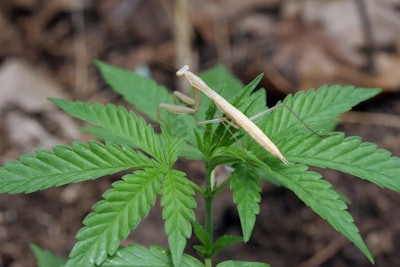
Pet treats and other pet products with cannabidiol (CBD) or other forms of hemp seem to be popping up daily. For example, my colleague Tim Wall reported on the dozens of new or existing cannabis-based ingredients in products exhibited at SuperZoo last month in Las Vegas.
In a weird coincidence — or should I say “cosmic,” given that we’re talking about cannabis? — on the first day of SuperZoo, June 25, 2018, the Food and Drug Administration (FDA) approved the first drug containing CBD for use and sale in the U.S. While this was a significant milestone, it’s also important to note that the product is for human use — and it is a drug. To date, FDA has not approved any CBD-based human foods or supplements.*
Nor has the agency approved the use of this substance, or any other part of the hemp plant, for use in pet foods or treats. So how could so many pet products with those ingredients be on the market?
Pet supplements instead of pet treats
While some companies seem to be ignoring or flouting the lack of regulatory approval by marketing cannabis-based products as pet treats, others are presenting their products as pet supplements instead. U.S. regulation of pet supplements is fairly convoluted. While supplements for humans fall under the Dietary Supplement Health and Education Act of 1994 (DSHEA), this law does not apply to products for pets — but neither do they qualify as drugs (nor do manufacturers want them to because of the regulatory implications).
This has created a regulatory void for pet supplements, which the National Animal Supplement Council has stepped in and up to fill by working with FDA as well as creating a quality seal audit program for pet supplement manufacturers. As David Dzanis, D.V.M, Ph.D., D.A.C.V.N., and author of the Petfood Insights column, explained: “NASC has developed a means to label some pet products in a manner that effectively escapes scrutiny as an animal feed by most states. Labeled similarly to human supplements, they may contain ingredients or bear claims not normally allowed.”
Education on CBD pet supplements is key
One company taking the pet supplement route is Treatibles, which offers grain-free functional chews, plus drops and gel capsules, featuring CBD. During SuperZoo, a company executive told me they are currently undergoing the NASC audit process and have deliberately avoided classifying their products in a way that would subject them to regulation as pet or animal feeds. For example, they call their main product chews instead of treats and, for all their products, recommend dosages rather than serving sizes or calories. The executive also said it’s not really proper to refer to the main ingredient as CBD; rather, they (and many others in this product category) use the term phytocannabinoid rich (PCR).
That’s because the part of the hemp plant used in these types of pet products, as well as similar products for humans, is far different from tetrahydrocannabinol (THC), another CBD component of the hemp plant that induces euphoria or hallucinogenic effects, or a high. THC is the main substance in marijuana. PCR components do not cause a high nor any similar effects experienced from using marijuana.
Educating both retailers and consumers about that fact and others is key for manufacturers of PCR pet supplements. For its part, Treatibles offers a weekly webinar called Training Tuesdays, in addition to providing other information about PCR products, how they work in the body and their purported health benefits for pets. In the June issue of Pet Business magazine, Hannah Miller also provided an in-depth report on the category and the science behind the products within it, based on interviews with several companies in the category.
CBD pet products: here to stay?
Though these supplements do not contain THC, the fact that marijuana continues to become legalized, for both medical and even recreational use by humans, in more and more states across the U.S. likely will only increase consumer interest and demand for CBD products for themselves and their furry family members.
Marijuana is definitely not safe for pets, and sadly, U.S. veterinarians are reporting more cases, usually inadvertent, of marijuana poisoning of pets. Nor is marijuana legal for human use at the federal level, which FDA was careful to state when it approved the CBD-based drug. Yet products containing other forms of CBDs, such as PCR, seem destined to claim their place on the market. Even FDA recognizes that with its approval of the medication for humans.
*Note: This blog post has been corrected from its original version to reflect that supplements with CBD are not approved for human use, either, though some companies making such supplements flout or ignore the lack of approval.

















